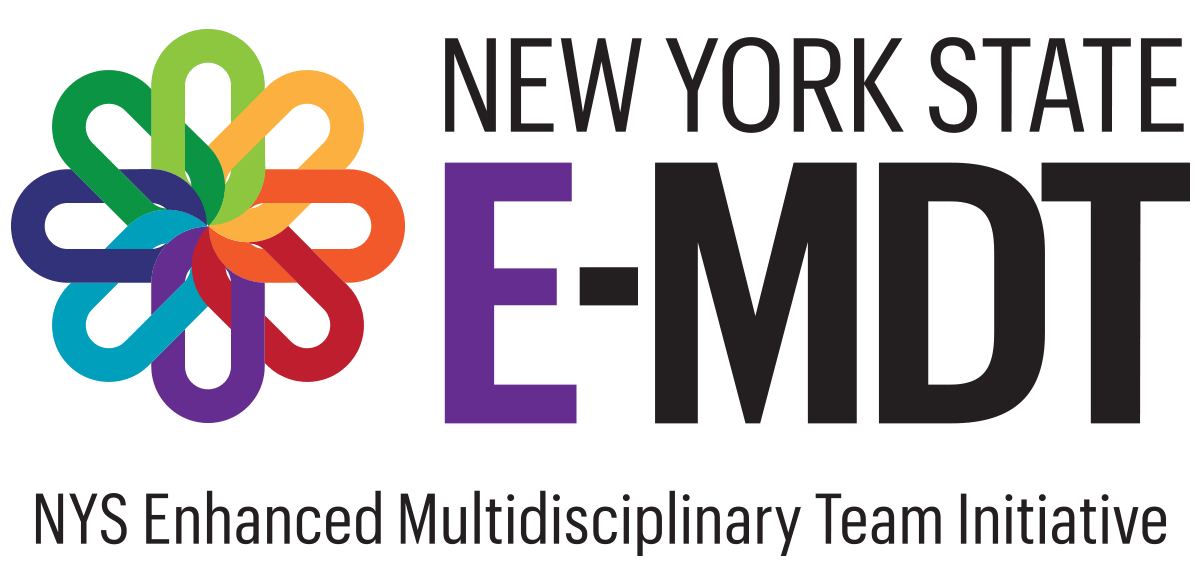E-MDT Participating Disciplines
The core mission of any E-MDT is to respond to elder abuse in a way that advances the well-being of and justice for the older adults whose interests the team exists to serve. The defining feature of an elder abuse E-MDT is that it brings professionals from across disciplines and systems into the same room, simultaneously, to problem solve together. While there’s no required checklist of members, a team whose members represent the agencies and systems typically involved in cases of elder abuse will be strongest and most effective. By referring cases to the E-MDT, sharing information with partners where appropriate, and disseminating information to agency staff to raise awareness of elder abuse, each partner agency collaborates to detect and intervene, and prevent further abuse.
E-MDT Coordinator
The E-MDT Coordinator provides skilled coordination of E-MDTs by facilitating team meetings, determining which cases merit review by the team, and evaluating the best use of the teams’ resources. The Coordinator is responsible for monitoring the progress of each case and engaging members of the team to offer support and ensure appropriate follow-up.
Adult Protective Services
Adult Protective Services (APS) is a mandated service program provided by local social services districts. It involves intake, investigation, and assessment of referrals of abuse, neglect, and financial exploitation of impaired vulnerable adults who live in the community. APS is a central member of E-MDTs and often the primary point of contact on the case. APS caseworkers conduct case investigation and intervention, provide expert input and follow-up on reviewed cases, and disseminate education on county systems and APS protocol to E-MDT members.
Office for the Aging
Aging services agencies ensure the dignity and quality of life of diverse older adults by providing older adults with access to a well-planned, coordinated package of in-home and other supportive services, often partnering with numerous community-based organizations. Aging services agencies utilize their expertise on aging and the vulnerabilities of older adults to provide information on services available for older adults and how to access them, expert input and recommendations on cases reviewed, and assist with case follow-up, when appropriate.
Law Enforcement
Law enforcement agencies play an essential role of enforcing the law to ensure victims’ safety. They strengthen the E-MDTs with their expertise in family and intimate partner violence dynamics, elder abuse, crisis intervention, and safety planning. Law enforcement provides the team with invaluable education about the protocol, responsibilities, and commitment to protecting older adults.
District Attorney’s Office
The District Attorney’s Office initiates and directs criminal investigations, issues subpoenas, presents cases to grand juries, files formal criminal charges, handles trials, and makes recommendations regarding sentencing. At the E-MDT, prosecutors are vital to demystifying the criminal justice system and the law for other team members. Prosecutors may express which cases can or can’t be prosecuted, what is allowed or is not allowed in an investigation, and how much information is needed to pursue a case. Prosecutors can also seek remedies (other than prosecution) that protect the victim’s physical or financial well-being, address root causes of problems they face, and frame claims in a way that might make a victim eligible for resources, consistent with information discussed at team meetings.
Forensic Accountant
Forensic accountants use auditing and investigative skills to produce evidence of financial matters for use in various legal proceedings. The forensic accountant conducts in-depth reviews of bank, credit card, and investment statements, analyzing transactions to determine the exploitation of victim assets. The forensic accountant prepares a report of findings and provides recommendations to the E-MDT, and testifies in court, if needed.
Mental Health Professionals
Mental Health Professionals have a variety of roles on the E-MDT, including: reviewing psychiatric evaluations conducted, making suggestions for referrals for treatment and services, communicating with medical providers involved in the older adult’s care, providing direct assessments, and testifying in court, if needed (e.g., guardianship proceeding).
Civil Legal Attorney
Civil Legal Attorneys support E-MDTs by identifying potential legal issues, reviewing legal documents, and understanding relevant court procedures. They provide expert input and recommendations on areas of civil law that most consistently affect elder abuse victims (e.g., landlord-tenant, guardianship, orders of protection, and advance directives). They act as liaisons between the E-MDT and the legal system by researching and/or providing legal history related to cases reviewed, providing pertinent information regarding laws related to financial exploitation and/or elder abuse; and providing legal services to the older adult victim, as appropriate.
When needed, E-MDTs liaise with additional partners to provide expertise on additional topics and specific cases. These partners could include, but are not limited to:
Attorney General’s Office
Community-based elder abuse prevention or response programs
Community Guardianship Program
Department of Social Services
Department of Taxation and Finance
Domestic Violence Service Provider
Elder Law Attorney
Financial Institutions
Health Care Provider
Internal Revenue Service agent
Long-term Care Ombudsman
Veteran’s Administration
Victim Service Advocate
Welfare Fraud Investigator

